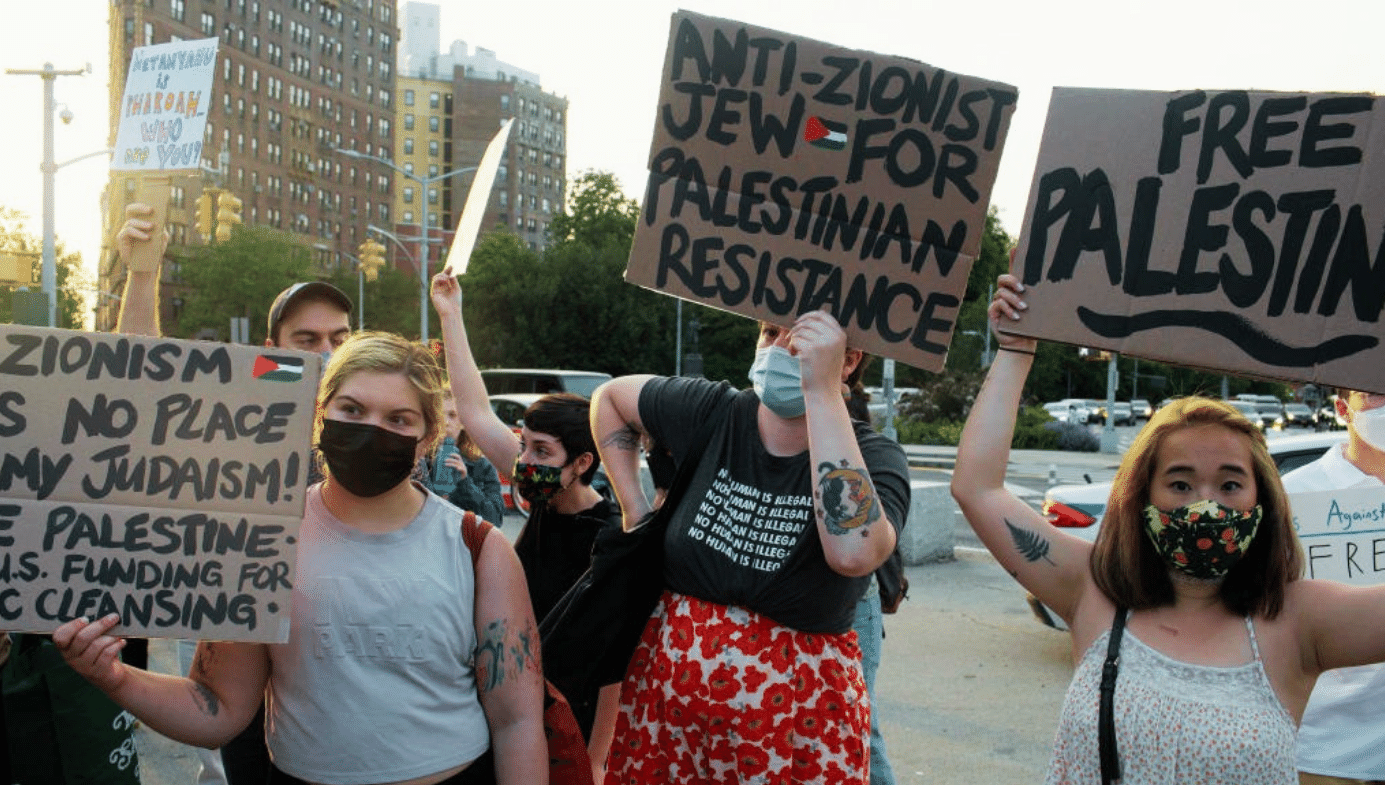social justice
How Social-Justice Extremists Spawned a Generation of ‘Progressive’ Antisemites
The dialog-based seminars organized by CAPS were primarily aimed at addressing racial injustice suffered by individuals classified under broad categories, including black, indigenous, and people of color.

In 2019, the Counseling & Psychological Services (CAPS) division of Stanford University’s Student Affairs department launched a Diversity, Equity, and Inclusion (DEI) training program with a mandate to instruct students about institutional racism. Instead, the program provided a case study of how radicalized forms of social-justice indoctrination can fuel antisemitism.
Earlier this year, Dr Ron Albucher, a Stanford psychiatrist and a former CAPS director, along with his colleague Sheila Levin, an eating-disorder specialist in the same department, filed complaints with federal and state civil-rights agencies regarding what they alleged to be “severe and persistent anti-Jewish harassment.” “Unfortunately, what we found was that the very program meant to help build an inclusive environment for all members of the Stanford community was, in fact, perpetrating the invidious discrimination it sought to eliminate,” wrote the complainants in an open letter published by the Stanford Daily last month.

The dialog-based seminars organized by CAPS were primarily aimed at addressing racial injustice suffered by individuals classified under broad categories, including black, indigenous, and people of color. The organizers used these categories to break participants up into racially segregated “affinity groups.” Albucher and Levin were assigned to the group designated under the label “whiteness accountability.” In the sessions, the pair alleges, seminar committee members “maligned and marginalized Jews by castigating them as powerful and privileged perpetrators who contribute to systemic racism.” Meanwhile, seminar moderators “intentionally overlooked antisemitic incidents” happening on campus.
On one occasion, the DEI group came together for a special session to discuss the “Zoom Bombing” of a Stanford University-wide virtual town hall meeting, which was marred by participants posting racist and antisemitic messages, invoking the N-word and images of swastikas. According to Albucher and Levin:
In the discussion of this event … DEI committee leaders decided to omit the swastikas, stating that they did not want antisemitism to dominate the discussion since Jews are wealthy business owners. When more swastikas were discovered in [Stanford] Memorial Church, DEI facilitators said we would discuss this incident only if time permitted. Yet, there was no further mention of this blatant expression of antisemitism. Failing to even acknowledge the very images used to promote Jewish genocide, especially during a DEI training, is deeply concerning.
These episodes have gained widespread attention because Stanford is an elite school, the alleged behaviour is particularly egregious, and witnesses to them have launched official complaints to government agencies. But this is not an isolated phenomenon. Indeed, what’s happened at Stanford is emblematic of progressive ideological doctrines that now treat the Jewish community as collateral damage in the push to attack and stigmatize “whiteness.”

This academic movement goes by various names. But they generally exist as variants of Critical Social Justice (CSJ), which encompasses Critical Race Theory (CRT) and other theoretical perspectives that encourage an understanding of society as shot through, in its every nook and cranny, with racism, sexism, and other bigotries. Though many of those who champion this ideological movement do so in good faith, and certainly do not intend to advance antisemitism, the smearing of Jews has been an effect nonetheless.
To be clear, we agree with the general principle that all forms of discrimination must be called out and confronted (much like Albucher and Levin themselves, who began their open letter by stating, “As psychotherapists, we strongly support diversity, equity and inclusion initiatives”). But given the manner by which Critical Social Justice ideology has been weaponized against Jews, our group, the American-based Jewish Institute for Liberal Values (JILV), opposes its continued imposition on institutions, including (ironically) many Jewish organizations. Likewise, we encourage other Jewish groups to raise their own voices, notwithstanding the manner by which CSJ proponents market their ideas as variations on “anti-racism” and other uncontroversial causes. We also invite interested parties to inspect our group’s recently released White Paper, in which we discuss the various ways in which CSJ ideology is harming the Jewish community, and in some cases fueling antisemitism:
- CSJ fuels the canard of monolithic Jewish privilege, which has long been a trope of antisemitic propaganda. Fliers circulated at the University of Illinois, for instance, presented a phalanx of Star of David-emblazoned Jewish stick figures lording over the rest of society. This newer form of antisemitism puts old forms of reactionary hate in new progressive bottles. Indeed, when the #JewishPrivilege hashtag went viral on Twitter last summer, it “unite[d] the woke left and alt-right in their antisemitism,” as one headline writer put it. Clubhouse, another social-media site, shut down several chatrooms earlier this year after they were reported as being, by one account, dedicated to “talking about how Jews control the federal reserve” and “Jews were behind the trans-Atlantic slave trade.”
- CSJ contributes to the “erasive antisemitism,” a term coined by Daphna Kaufman of the Zionist NGO Reut. Erasive antisemitism categorizes Ashkenazi Jews from Europe as “white”—a “de-facto undermining of Jewish narrative self-determination. It negates the rights of Jews individually or collectively to define their own identity, experience, and vulnerability. It is largely an unintended consequence of contemporary progressive discourse.” Under the CAPS program at Stanford, Levin writes, the organizers “assume[d] that because I am Jewish, that I am white, or that I can hide behind my white identity, and that I, therefore, belong in the ‘white affinity’ group.” As she told a student newspaper, “my people were murdered because we were seen as contaminants to the white race, so being told that I would have to identify and have commonality with people who systematically imposed genocide on Jews … felt like a betrayal to my family.”
While this marginalization of Jews is not intentional, Kaufman argues, it does flow directly from the unsettling idea that the world can be categorized in binary fashion, between oppressed non-whites and white oppressors. The corollary is that specific forms of bigotry directed against Jews qua Jews should not be called out—an idea encapsulated by a bizarre May 2021 episode at Rutgers University-New Brunswick, in which the school’s chancellor retracted her own condemnation of antisemitism because it wasn’t rhetorically conjoined with a simultaneous condemnation of Islamophobia. Scarcely two months later, April Powers, the Chief Equity & Inclusion Officer at the Society of Children’s Book Writers and Illustrators, who happens to be a black Jew, was forced to resign her position and received death threats after publicly condemning antisemitic attacks while failing to call out Islamophobia in the same breath. Even the Holocaust itself is now being stripped of its Jewish character: Last year, a Holocaust museum in Florida mashed up anti-racism quotations and Holocaust references in an exhibit about racism in America. Amazingly, one even finds some university students trivializing the Holocaust entirely by dismissing it as mere “white-on-white crime.” - CSJ promotes the concept of intersectionality, the now widely popularized progressive framework that presents one’s life experience as a mathematical product of the various intersecting identities that serve to generate complicated, compounded forms of discrimination and disadvantage. Under intersectionality’s vague rubric—and following on the binary, Manichean character of CSJ more generally—groups with “critical consciousness” are pushed to stand in solidarity against other, completely unrelated groups that are deemed to exist in the category of “oppressor.” At Columbia University, for instance, Students for Justice in Palestine formed an alliance with No Red Tape, a student group fighting sexual violence. This was explained by reference to the claim that “the way that No Red Tape conceives of sexual violence is a form of oppression that is related … to other forms of oppression,” and that “sexual violence is a deeper political issue, and it cannot be divorced or separated from other oppressed identities.” The linkage here is of course purely rhetorical. But since Jews (Zionist Israeli Jews, in particular) are cast as a source of oppression, it is a connection that many students now have been pressured to accept.
- Since CSJ encourages the idea that Israel’s relationship with Palestinians can be cast in the same one-size-fits-all white-oppressor-versus-non-white-victim model, it is not surprising that hostility to Israel became embedded in the Black Lives Matter movement and endorsed by the academics who support it. During Israel’s most recent conflict with Hamas, progressive Democrats vilified the Jewish state for acts of self-defense. One congressman, Jamaal Bowman, claimed Israel was murdering “Black and brown bodies,” as if Hamas might be seen as one giant collective George Floyd. At Princeton University, a collectively authored “statement of solidarity” from academics denounced “Jewish supremacy,” an inartful attempt to present Israeli Jews as a Middle Eastern Ku Klux Klan. Black Lives Matter tweeted support for “Free Palestine,” while referring to Israel as “settler colonialists” and trying to draw a linkage between defunding American police and ending support for Israel. Antisemitic incidents around the world are surging, and are often conducted on the pretext of striking back at Israel. CSJ ideology serves as an enabling ideology for much of this hatred, insofar as it blurs the line between antisemitic hate and legitimate social-justice protest.
- Increasingly, Jews have become politically homeless, alienated by both the populist Right, and by the CSJ ideology they see infusing progressive ideological currents within the Democratic party. (Nearly 70 percent of Jews see the Democratic party as their traditional home, according to aggregated Gallup polls.) In some cases, younger progressive Zionists on campus are effectively forced to choose between their liberal politics and their religious affiliations, as they are being instructed to check their Zionism at the door, lest they be seen by others as “complicit in racism.” Jewish LGBTQ+ activists, similarly, have been forced out of gay-rights parades in both Chicago and Washington, DC for donning rainbow flags with a Jewish star. And publicity materials for the 2021 Chicago “Dyke March” posted on Instagram portrayed a woman burning both the American and Israeli flags. If such trends continue, many American Jews might find themselves in a situation similar to that of British Jews following Jeremy Corbyn and his allies’ ascension to the UK Labour party’s leadership in 2015.
- CSJ denigrates the professional and academic accomplishments of Jews by presenting them as “conditionally white” or “white adjacent” beneficiaries of white supremacism. One “critically informed” social-work curriculum, for instance, teaches that the notion of Jews pulling themselves up by their bootstraps “is a myth.” Having “become white,” the narrative goes, Jews benefited from federal programs that allowed “Jews and other European immigrants to be recognized or rewarded.” Indeed, according to Ibram X. Kendi’s notion of “equity,” any disparities in outcome between groups are presumed to have been caused by discrimination. In this formulation, Jews who’ve outpaced non-Jews in certain fields are worse than whites: They’re “hyper-white.”

There is a much broader, seventh point we will end on—and it’s one that affects Jew and gentile alike: With its narrow focus on skin colour and bloodline, CSJ undermines all of the liberal, tolerant Enlightenment principles that have made the United States and other Western democracies beacons of freedom and pluralism for generations.
This is of special concern to Jews because throughout our modern history we have generally thrived in societies that demonstrate a commitment to rationalism, reason, logic, and debate—as opposed to those societies that divide human beings into rigid ethnic categories, separating out the “good” ones from the “bad.” CSJ’s proponents also have consistently betrayed an often shocking intolerance to dissent when it comes to their dogmas, thereby challenging the ethos of free speech and debate by which Jews have traditionally championed their claims for equal treatment in the public square.
Critical Social Justice presents as the antidote to bigotry. But in the increasingly radical form now taking root on campuses, it has become the proverbial cure that’s worse than the disease. And so while we applaud those progressives who call out the specifically antisemitic—and more generally anti-liberal—elements of CSJ, it has now become clear that it is the ideology as a whole that must be rejected.
David Bernstein (@DavidLBernstein), Nicole Levitt (@LevittNicole7), and Daniel Newman (@DNewman20) are, respectively, the CEO, Policy manager, and Marketing officer of the Jewish Institute for Liberal Values.







